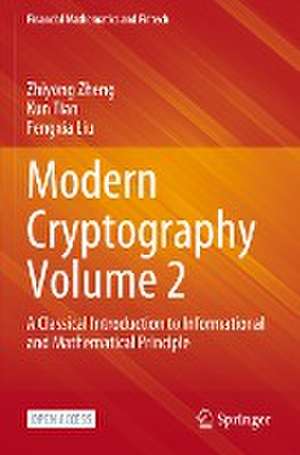Modern Cryptography Volume 2: A Classical Introduction to Informational and Mathematical Principle: Financial Mathematics and Fintech
Autor Zhiyong Zheng, Kun Tian, Fengxia Liuen Limba Engleză Paperback – 11 dec 2022
This book is used as a professional book for graduate students majoring in mathematics and cryptography, as well as a reference book for scientific and technological personnel engaged in cryptography research.
| Toate formatele și edițiile | Preț | Express |
|---|---|---|
| Paperback (1) | 279.98 lei 3-5 săpt. | +17.99 lei 7-13 zile |
| Springer Nature Singapore – 11 dec 2022 | 279.98 lei 3-5 săpt. | +17.99 lei 7-13 zile |
| Hardback (1) | 359.59 lei 3-5 săpt. | +25.59 lei 7-13 zile |
| Springer Nature Singapore – 11 dec 2022 | 359.59 lei 3-5 săpt. | +25.59 lei 7-13 zile |
Preț: 279.98 lei
Nou
Puncte Express: 420
Preț estimativ în valută:
53.58€ • 56.34$ • 44.27£
53.58€ • 56.34$ • 44.27£
Carte disponibilă
Livrare economică 26 martie-09 aprilie
Livrare express 12-18 martie pentru 27.98 lei
Preluare comenzi: 021 569.72.76
Specificații
ISBN-13: 9789811976469
ISBN-10: 9811976465
Pagini: 191
Ilustrații: XI, 191 p. 2 illus.
Dimensiuni: 155 x 235 x 22 mm
Greutate: 0.29 kg
Ediția:1st ed. 2023
Editura: Springer Nature Singapore
Colecția Springer
Seria Financial Mathematics and Fintech
Locul publicării:Singapore, Singapore
ISBN-10: 9811976465
Pagini: 191
Ilustrații: XI, 191 p. 2 illus.
Dimensiuni: 155 x 235 x 22 mm
Greutate: 0.29 kg
Ediția:1st ed. 2023
Editura: Springer Nature Singapore
Colecția Springer
Seria Financial Mathematics and Fintech
Locul publicării:Singapore, Singapore
Cuprins
Chapter 1. Gauss lattice theory.- Chapter 2. Reduction principle of Ajtai.- Chapter 3. Learning with errors.- Chapter 4. LWE cryptosystem.- Chapter 5. Cyclic lattice and Ideal lattice.- Chapter 6. Fully Homomorphic Encryption.- Chapter 7. General NTRU cryptosystem.
Notă biografică
Zhiyong Zheng is Professor and Dean of School of Mathematics, Renmin University. His research and academic experiences include in 1995, Princeton University, as Visiting Scholar; in 1988-1991,Shandong University, Ph.D. He received Distinguished Paper Award (ICCM 2018), Qiu Shi Outstanding Young Scholar Award (1997) and The National Science Fund for Distinguished Young Scholars (1996). He was Dean of School of Mathematics, Renmin University of China. His research area includes Diophantine approximation, character sum and cryptography
Textul de pe ultima copertă
This open access book covers the most cutting-edge and hot research topics and fields of post-quantum cryptography. The main purpose of this book is to focus on the computational complexity theory of lattice ciphers, especially the reduction principle of Ajtai, in order to fill the gap that post-quantum ciphers focus on the implementation of encryption and decryption algorithms, but the theoretical proof is insufficient. In Chapter 3, Chapter 4 and Chapter 6, author introduces the theory and technology of LWE distribution, LWE cipher and homomorphic encryption in detail. When using random analysis tools, there is a problem of "ambiguity" in both definition and algorithm. The greatest feature of this book is to use probability distribution to carry out rigorous mathematical definition and mathematical demonstration for various unclear or imprecise expressions, so as to make it a rigorous theoretical system for classroom teaching and dissemination. Chapters 5 and 7 further expand and improve the theory of cyclic lattice, ideal lattice and generalized NTRU cryptography.
This book is used as a professional book for graduate students majoring in mathematics and cryptography, as well as a reference book for scientific and technological personnel engaged in cryptography research.
Caracteristici
This book is open access, which means that you have free and unlimited access Covers cutting-edge topics and compiled from the latest scientific research achievements in the past 20 years Uses probability distribution to carry out rigorous mathematical definitions and mathematical demonstrations This book fills the gap in the insufficient theoretical proofs of post-quantum cryptographic algorithms







